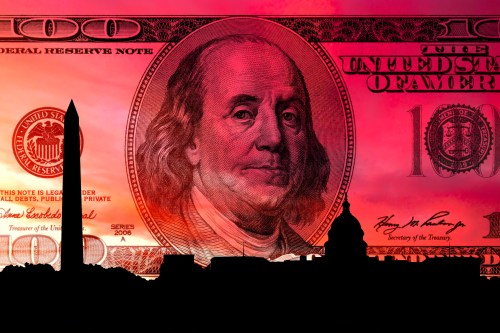Happy Tuesday! Congratulations to Tom Kopke, who for the second straight year won the Gloucestershire cheese-rolling competition in England. “I risked my life for this,” he said after winning the contest in which people chase a wheel of cheese down a steep hill. “It's my cheese—back to back.”
Quick Hits: Today’s Top Stories
- Russia hit Ukrainian cities and towns in a massive drone and missile attack for the third straight day early Monday morning, killing at least 30 civilians and injuring more than 163 others, per Ukrainian authorities. According to Ukrainian President Volodymyr Zelensky, Russian forces unleashed 355 drones—the largest number deployed in a single assault since the war’s outbreak—and nine cruise missiles against Ukraine. On Sunday night, President Donald Trump criticized Russian President Vladimir Putin’s aerial attacks, saying he “has gone ABSOLUTELY CRAZY.” In response, Kremlin spokesman Dmitry Peskov said on Monday that Russia was “grateful” for Trump’s work in organizing negotiations but added that the current situation can lead to “emotional overload of everyone absolutely and with emotional reactions.”
- Trump also levied new threats against Harvard University on Monday morning, sharing on social media that he was considering taking away $3 billion in grant funding from the university and dispersing it among trade schools. In a separate post Monday morning, Trump criticized Harvard for not sharing information about its foreign students, which he said is necessary to help his administration determine “how many radicalized lunatics, troublemakers all, should not be let back into our Country.” While the White House on Thursday barred Harvard from enrolling international students—citing the university’s refusal to hand over information of its foreign students—the university quickly sued the administration, and on Friday a federal judge temporarily blocked the move until the merits of the case could be heard.
- In response to a Financial Times article this weekend reporting that U.K. officials are investigating possible Russian involvement in the recent arson attacks on U.K. Prime Minister Keir Starmer’s personal home and other property he formerly owned—per unnamed British senior officials—Kremlin spokesman Dmitry Peskov denied any Russian culpability. “All these suspicions are groundless, unsubstantiated and often laughable,” he said. British prosecutors have charged three men, two Ukrainian nationals and one Romanian citizen, in connection with the arson attacks.
- News outlets reported Monday that Israel rejected a ceasefire proposal from Hamas because it would secure neither the full release of all hostages held by the terror group nor end the war. Hamas officials said Monday that their proposal was presented to them by the U.S., a claim that Trump’s special envoy to the Middle East, Steve Witkoff, later refuted. The U.S. has proposed a different deal that would exchange 10 living Israeli hostages and 19 deceased hostages for a ceasefire ranging from 45 to 60 days and the release of certain Palestinian prisoners, which Witkoff said Israel has accepted. “That deal is on the table,” Witkoff said Monday. “Hamas should take it.”
- Homeland Security Secretary Kristi Noem on Sunday spoke with Israeli Prime Minister Benjamin Netanyahu about ongoing U.S. negotiations with Iran over its nuclear program, later telling Fox News it was “a very candid conversation.” Meanwhile, a statement from Netanyahu’s office said that Noem offered “unwavering support” for Israel, and praised Netanyahu for “his conduct of the war” in Gaza and for establishing a fence along the Israeli-Egyptian border. On Monday, Noem attended a ceremony commemorating the lives of Yaron Lischinsky and Sarah Milgrim, the two Israeli embassy officials killed by a pro-Palestinian American gunman in Washington, D.C., last week.
- Trump said he will issue a “FULL and Unconditional Pardon” to Scott Jenkins, a former sheriff of Culpeper County, Virginia, who was sentenced to 10 years in federal prison following a December 2024 conviction on charges including conspiracy, honest services fraud, and bribery involving federally funded programs. The president, announcing the decision on social media, said Jenkins had been “dragged through HELL by a Corrupt and Weaponized Biden DOJ.”
- Charles Rangel, a former longtime Democratic congressman from New York and a decorated Korean War veteran, died Monday at age 94. Rangel was awarded a Purple Heart and Bronze Star for valor for leading 43 U.S. soldiers to safety by crossing over a mountain while injured at the Battle of Kunu-ri. He was elected to the House of Representatives in 1971, where he served until retiring in 2017. Between 2007 and 2010, Rangel chaired the House Ways and Means Committee—the first black congressional member to hold the position—but had to step down after the House voted to censure him in 2010 for 11 ethics violations.
Johnson Earns Major Victory With Megabill’s Passage

To House Speaker Mike Johnson, wrangling opposing Republican factions to support “one big, beautiful” reconciliation megabill that includes President Donald Trump’s legislative agenda was more than a high-wire act—it was, in his own words, like “crossing over the Grand Canyon on a piece of dental floss.”
But on Thursday, Johnson made it farther than many expected. The sprawling bill—more than 1,000 pages long—passed the House by just one vote, 215-214, ahead of Johnson’s self-imposed Memorial Day deadline. A handful of last-minute changes ...
As a non-paying reader, you are receiving a truncated version of The Morning Dispatch. Our full 1,560-word story on Congress' reconciliation bill is available in the members-only version of TMD.
Today’s Must-Read
Crises can be useful for pressure-testing systems and exposing their weaknesses. Such is the case with the delays and outright cancellations of federal funds for worthy biomedical science research projects. DOGE-engineered interruptions of research programs funded by the National Institutes of Health (NIH) and National Science Foundation (NSF)—with only muted objections by politicians and the public—reveal a systemic brittleness in the public’s support for science. It is possible that the public’s unwillingness to rise up in defense of science owes much to its having lost faith in scientists. … My fellow scientists would probably like to believe that our sinking poll numbers reflect the public’s distaste for marauding students and censorious humanities colleagues. But we must admit that we share some of the blame. We do not put enough effort into explaining our work to the members of the public, who are our patrons.
Toeing the Company Line
Unmet Obligations
On yet another descent into fiscal imbecility.
Don’t Bail Out the Farmers
Elections have consequences.
Worth Your Time
- In the Washington Post, George Will writes, “On this Memorial Day, take a moment for Ernie Pyle’s ‘The Death of Captain Waskow.’ “[Pyle] was a middle-aged Middle American travel writer until Hitler tried bringing Britain to its knees by bombing. The Blitz brought the war, as reported by Edward R. Murrow of CBS radio, to the United States, and brought Pyle to the European theater of a war he would not survive. War, as reported by him from what he called the ‘worm’s eye view,’ was war as the common soldiers experienced it: discomfort, weariness, mud, filthiness, loneliness and stretches of boredom punctuated by episodes of death. Death somehow simultaneously random and routine. David Chrisinger, in his 2023 book ‘The Soldier’s Truth: Ernie Pyle and the Story of World War II,’ tells the story of the man who wrote this.” Pyle’s work immortalized one war veteran in particular: “Henry T. Waskow, writes [David] Chrisinger, worked his way up from the lowest enlisted ranks to captain, an extraordinarily beloved officer but also an ‘ordinary man.’ Moments before his death he had a craving for toast.” Thousands of Americans still seek Waskow’s grave at the Sicily-Rome American Cemetery in Italy, but he’s not the only war hero buried there. “Referring to all those in the cemetery, [a guide] said: ‘Most of these boys have never had a visitor.’” Will writes, “Visit them in your mind this Memorial Day.”
- In Law and Liberty, Aidan Grogan observes that nostalgia for the good ol’ days is nothing new. “In his 1804 poem ‘Jerusalem,’ Romantic poet William Blake lamented the ‘dark Satanic Mills’ of the Industrial Revolution blotting out the green pastures and natural beauty of England. Blake’s critique of industrialization and its economic and social disruptions reflected the growing pains of a society in transition—from an economic order of rural, impoverished subsistence to one of urban, technological affluence,” Grogan wrote. “Two centuries later, a new transition is underway as developed economies shift from manufacturing to services. But among economic populists, a new Blakean nostalgia has manifested for the days of yore, except this generation of romantics dreams of a return to the ‘dark Satanic mills’ that Blake despised.” Would returning to the mills lead to a better, revitalized life? “The dark, satanic mills were engines of economic progress, but wistful longing for manual labor in factories overlooks how these economic conditions undermined traditional social structures and uprooted men and women from an environment conducive to child-rearing. … The twenty-first century’s digital economy may ironically enable a true ‘return to tradition’ that conservatives, in particular, should welcome.”
Presented Without Comment
Washington Post: EU Says It Will Fast-Track Tariff Talks With U.S. After Trump Threat
Paula Pinho, a spokeswoman for the European Commission, told reporters Monday that there was “new impetus” for the talks, which have been ongoing for weeks.
“They agreed both to fast-track the trade negotiations and to stay in close contact,” Pinho said. “It’s positive to see that there’s engagement also at the level of the presidents, and from our side, we always said that we were ready to make a deal.”
In the Zeitgeist
Pittsburgh Pirates slugger Oneil Cruz blasted a home run Sunday that left the bat going 122.9 miles per hour. That’s the hardest-hit ball since Major League Baseball’s Statcast analytics tool started keeping track in 2015.
Watch the moment Cruz powered the ball out of the stadium. (That streak of white from the bat, midswing, is indeed the ball.)











Please note that we at The Dispatch hold ourselves, our work, and our commenters to a higher standard than other places on the internet. We welcome comments that foster genuine debate or discussion—including comments critical of us or our work—but responses that include ad hominem attacks on fellow Dispatch members or are intended to stoke fear and anger may be moderated.
With your membership, you only have the ability to comment on The Morning Dispatch articles. Consider upgrading to join the conversation everywhere.